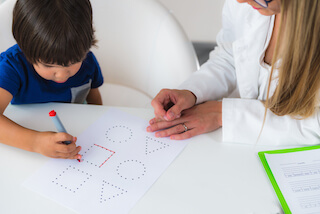Dr. Megan Aros-O’Malley, Ph.D., Psychologist
 Dr. Aros-O’Malley is a pediatric fellowship trained licensed psychologist who specializes in working with children, adolescents, and their families. She has expertise in providing evidence-based therapy and has extensive training in performing psychological and neuropsychological assessments to a diverse populations of youth with a variety of presenting concerns. She is certified in the gold standard assessment for autism spectrum disorder – the Autism Diagnostic Observation Schedule, 2nd Edition (ADOS-2) and in evaluating a multitude of childhood challenges and conditions including, but not limited to: Attention-Deficit/Hyperactivity Disorder, Specific Learning Disorders, Autism Spectrum Disorder, Intellectual and Developmental Disabilities, Depression, Anxiety, and, Obsessive Compulsive Disorder. Dr. Aros-O’Malley strives to create a warm and welcoming environment for families. She takes a strengths-based approach to practice and believes in helping youth and their families find their best qualities in order to improve resilience.
Dr. Aros-O’Malley is a pediatric fellowship trained licensed psychologist who specializes in working with children, adolescents, and their families. She has expertise in providing evidence-based therapy and has extensive training in performing psychological and neuropsychological assessments to a diverse populations of youth with a variety of presenting concerns. She is certified in the gold standard assessment for autism spectrum disorder – the Autism Diagnostic Observation Schedule, 2nd Edition (ADOS-2) and in evaluating a multitude of childhood challenges and conditions including, but not limited to: Attention-Deficit/Hyperactivity Disorder, Specific Learning Disorders, Autism Spectrum Disorder, Intellectual and Developmental Disabilities, Depression, Anxiety, and, Obsessive Compulsive Disorder. Dr. Aros-O’Malley strives to create a warm and welcoming environment for families. She takes a strengths-based approach to practice and believes in helping youth and their families find their best qualities in order to improve resilience.
Professional Credentials
Undergraduate Education
Arizona State University, B.A. Psychology
Graduate Education
University of Arizona, Ph.D. School Psychology
University of Arizona School of Psychology, Master of Arts
Doctoral Internship / Residency
Cypress-Fairbanks Independent School District, Doctoral Internship
Austin Child Guidance Center, Clinical Child/Adolescent Psychology Postdoctoral Fellowship
Professional Organizations
American Psychological Association
National Association of School Psychologists
Licensure
Multistate Licensure via PSYPACT
Child Psychotherapy
 Child psychotherapy is an integrative approach to mental health treatment which is rooted in the therapeutic relationship between the therapist, child, and parents. Child psychotherapy allows for an open, supportive dialogue focused on identifying and changing thought patterns/behaviors in the context of family dynamics that may be affecting the child’s mental wellness. Evidence based therapies such as cognitive behavioral therapy can improve a child’s behaviors, self-control and self-esteem. Parent behavioral training for younger children can also help parents with strategies to help their child succeed at school, at home, and in relationships.
Child psychotherapy is an integrative approach to mental health treatment which is rooted in the therapeutic relationship between the therapist, child, and parents. Child psychotherapy allows for an open, supportive dialogue focused on identifying and changing thought patterns/behaviors in the context of family dynamics that may be affecting the child’s mental wellness. Evidence based therapies such as cognitive behavioral therapy can improve a child’s behaviors, self-control and self-esteem. Parent behavioral training for younger children can also help parents with strategies to help their child succeed at school, at home, and in relationships.
Psychological Testing
 Psychological testing helps clarify appropriate diagnoses and determine the neurocognitive profile (i.e., strengths and weaknesses) of a child through standardized, objective, and reliable measures and qualitative data. With this enhanced understanding of the child, a psychologist can then identify effective interventions and techniques to better support the child. It is most useful in assessing and identifying effective recommendations for the following conditions: Learning Disabilities, Intellectual Disability, Attention Deficit Hyperactivity Disorder (ADHD), Autism Spectrum Disorder, and other psychological conditions (i.e., Anxiety, Depression).
Psychological testing helps clarify appropriate diagnoses and determine the neurocognitive profile (i.e., strengths and weaknesses) of a child through standardized, objective, and reliable measures and qualitative data. With this enhanced understanding of the child, a psychologist can then identify effective interventions and techniques to better support the child. It is most useful in assessing and identifying effective recommendations for the following conditions: Learning Disabilities, Intellectual Disability, Attention Deficit Hyperactivity Disorder (ADHD), Autism Spectrum Disorder, and other psychological conditions (i.e., Anxiety, Depression).

